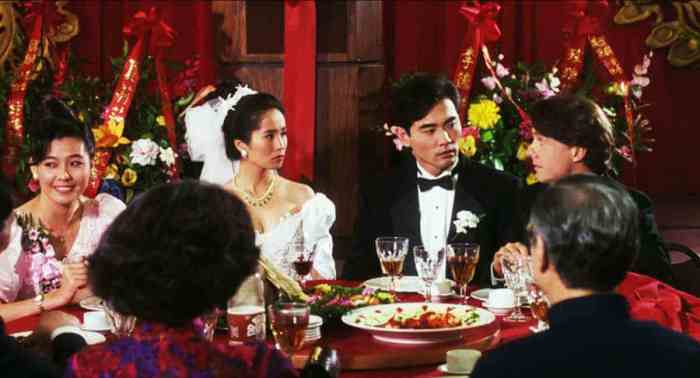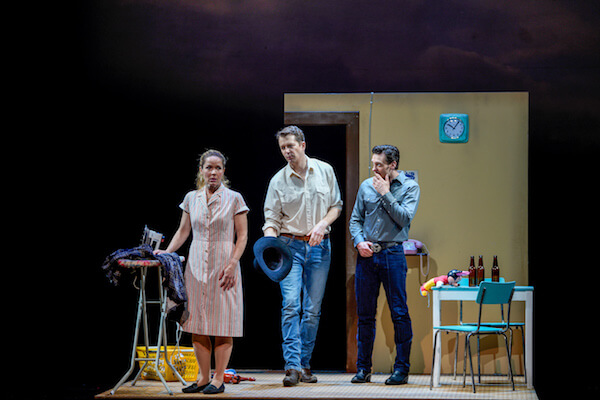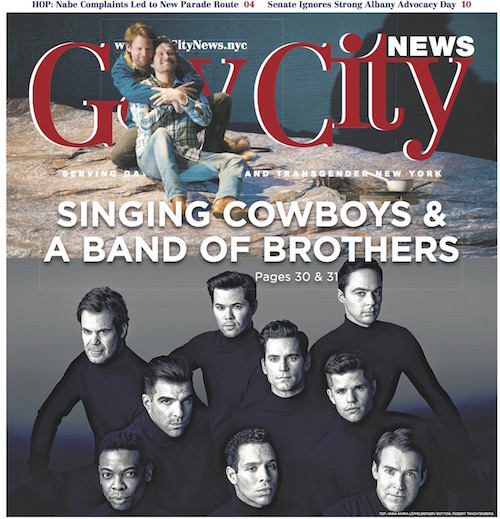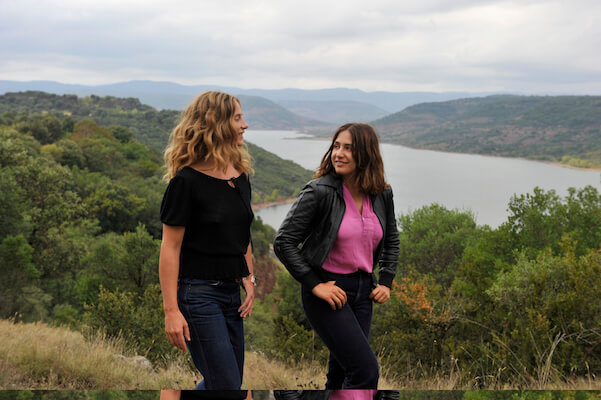Alex Secareanu and Josh O’Connor in Francis Lee’s “God’s Own Country.” | ORION PICTURES/ SAMUEL GOLDWYN FILMS
“God’s Own Country” is a raw and powerful romantic drama focused on Johnny (Josh O’Connor), a closeted young man living on his ailing father’s (Ian Hart) failing Yorkshire farm.
His life changes when Gheorghe (Alex Secareanu), a Romanian, comes to help out during lambing season. While Johnny is initially hostile toward Gheorghe, calling him “gypsy,” an attraction slowly develops between the two men that becomes tender and loving.
Josh O’Connor and Alex Secareanu play a Yorkshire farmer and the Romanian newcomer who saves him
Writer and director Francis Lee has crafted a compelling character study that is aided by the authenticity of its depiction of farm life. The magnetic Secareanu gives an assured, seductive performance. But it is Josh O’Connor, who palpably conveys Johnny’s emotional suffocation, that will make “God’s Own Country” get under viewers’ skin.
Lee spoke with Gay City News via Skype about making his tough but tender film.
GARY M. KRAMER: What inspired this love story, which has already garnered comparisons to “Brokeback Mountain?”
FRANCIS LEE: The starting point was the landscape. I grew up on the Pennines Hills of West Yorkshire in a similar kind of landscape as where I shot the film. It was my playground. It was a landscape that inspired me to find freedom and creativity, but I also found it to be brutal and oppressive. I left when I was 20 to go to college. and the whole time I was away I was obsessed with the landscape and how it formed me physically and emotionally.
When I started to make the film, it was natural for me to explore those feelings and look at people I lived and worked with. I thought about big themes, and they become distilled into a story — the themes of falling in love, and how hard it is, and how difficult I found it to be open enough to love and be loved. Those things collided.
GMK: The film features many scenes of the young men caring for animals in rather graphic ways. Can you talk about why you showed so much explicit detail of animal husbandry?
FL: It’s an interesting point. I don’t see it as graphic at all. I come from that community. When I was a child, I delivered animals — pigs in particular — and it was important for me to depict the reality and authenticity of rural farming life.
Animal husbandry is about the circle of life. I’d have one hand delivering a piglet and a bacon sandwich in the other hand. As urban dwellers, we are disassociated with how farming happens. It shows Johnny’s sensitive caring side. He’s difficult and tough with his family but tender with his livestock.
GMK: The character of Johnny is not always likeable. He’s self-destructive, rude, and selfish. Can you talk about how you developed his character?
FL: I wasn’t afraid to make him unlikeable. What I wanted to look at was somebody’s transformation in terms of his emotional life. I wanted to be truthful to the character. Even as he progresses, you begin to understand why he is the way he is. The challenge was having this inarticulate character trying to express himself. For me, it was that journey I found resonant, how hard it was for him. We as an audience might not be on his side, but by the end we are rooting for him, and as he develops so has our perception of him.
GMK: In contrast, Gheorghe was full of confidence and sex appeal. What made him a good foil for Johnny, and why was he attracted to Johnny?
FL: I think that what Gheorghe is is a very maternal character. He’s more self-possessed and understands more of himself. He has a need to care, and we see that in how he cares for the animals and changes the environment when he arrives. We see him take the light bulb and put it into a lamp to transform his environment in the caravan.
He’s attracted to Johnny because he’s sexy and he mirrors who he could have been or who he was until he was processed. Gheorghe has a need to care, and he sees someone in Johnny whom he accepts for all his faults as well as the good stuff, which is the epitome of love for me.
GMK: The film addresses issues of foreigners in the UK. Gheorghe makes references to his homeland that indicate why he didn’t stay. But he doesn’t get a particularly warm welcome in Yorkshire. Can you discuss this?
FL: I always knew I wanted Gheor-ghe to be an outsider, and when Romania joined the EU, the UK tabloid press had a field day with xenophobia. They suggested the UK would be flooded with Romanian gypsies to exploit our [National Health Service], jobs, and social security system. That didn’t happen, but the casual xenophobia was spread. When I wrote the script, Brexit hadn’t happened, but it has since taken on a more significant meaning.
I worked with a Romanian, and all he wanted was a better his life for himself and his wife. I was ashamed of the reaction he generally had from the UK, and I was compelled to understand the emotional and physical way he coped with that.
GMK: The film is rare in that it depicts queer life in a rural community. Can you talk about the attitudes you’ve encountered?
FL: I think it’s a real interesting question. I’ve been surprised that there is an assumption from people who don’t live in a rural community that people harbor homophobia. This is my experience. I’ve not come across any homophobia. They don’t talk about it, necessarily. I write from a personal and emotional perspective. I can’t speak for the rural community in the States, or queers in other rural communities, but I can speak for my area. A local town in my area has the highest lesbian population in the UK.
GMK: The film uses space carefully, from the majestic shot on the hillside to the cozy interior of the caravan. Can you talk about the visual approach you took to telling the story?
FL: I felt that this landscape had informed me emotionally and physically. I’ve never seen this landscape depicted on screen this way. Yorkshire is seen as bucolic and pastoral, but I’ve felt passive as a viewer. My experience is how cold, windy, wet, and muddy, and how if you’re working on the land the last thing you do is go for a walk and experience it as voyeur. I knew I wanted to represent it from a specific point of view, the eyes of Johnny, who works the land. So I wanted the camera up close and personal, so I worked with the DP to experience this world very much from Johnny’s point of view and we’d see the landscape form the characters. We held back on the wide shot until Johnny experiences it for the first time through Gheorghe’s eyes. It’s a real sense of freedom and freeing up of him. He gets to work there, and it does have incredible, overpowering beauty.
GOD’S OWN COUNTRY | Directed by Francis Lee | Orion Pictures/ Samuel Goldwyn Films | Opens Oct. 25 | IFC Center, 323 Sixth Ave. at W. Third St. | ifccenter.com



































